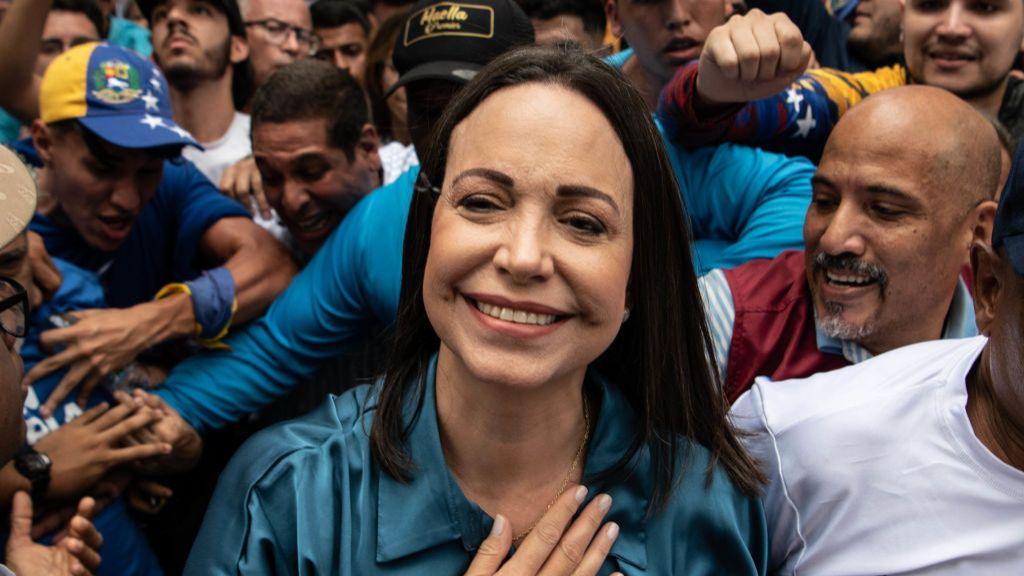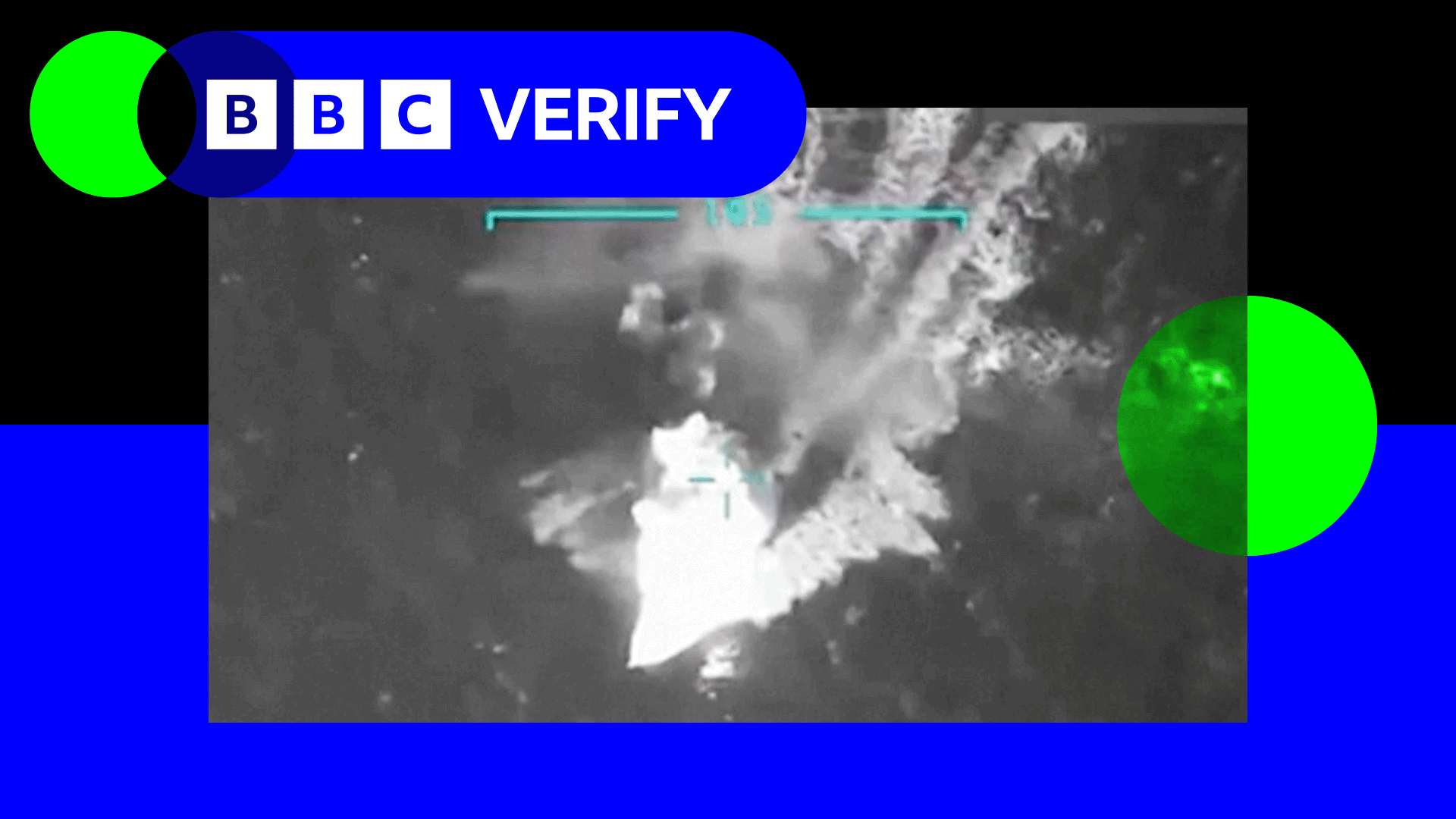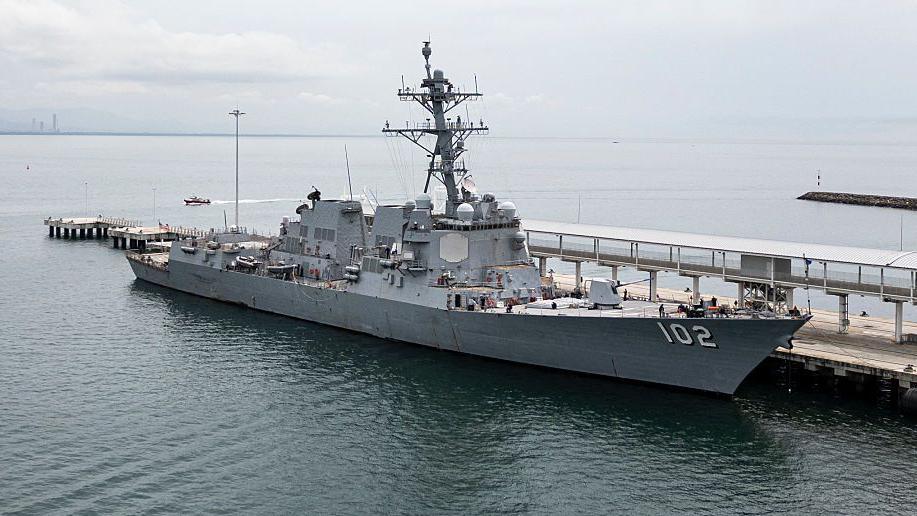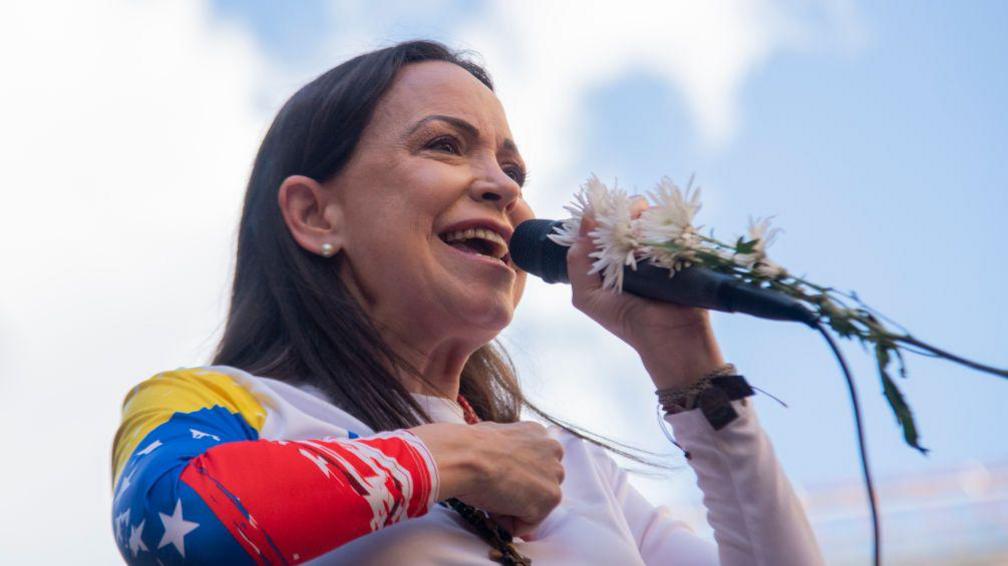As Nobel Prize goes to Venezuela's opposition leader, how far would Trump go to help her?

- Published
This Nobel Prize win for Maria Corina Machado is being hugely welcomed by the opposition in Venezuela.
The hope is it will draw renewed international attention to their cause.
Responding to the prize, Machado directly called for help from the man who had hoped he would win it.
"Today more than ever we count on President Trump," Machado said.
She hopes through the help of him, the US, other nations in Latin America and "democratic nations of the world", Venezuela will "achieve freedom and democracy."
The question is: how far will Donald Trump go?
Venezuelan opposition leader María Corina Machado wins Nobel Peace Prize
- Published10 October
There is a lot at stake in Venezuela right now.
Picture a country where millions of people live in poverty. Basic services, like electricity, are unreliable in many areas. The health system is in crisis, with acute medicine shortages. Millions of people citizens have fled in recent years, many to the US or neighbouring countries.
The last election was widely dismissed internationally as neither free nor fair. Security forces cracked down on protests after the vote, with many people detained. Human rights organisations believe there are still hundreds of political prisoners.
More recently, the US has started bombing boats off the country's coast – in international waters – which it alleges carry drug traffickers. Lawyers say the strikes could breach international law.
This is just a snapshot of the situation in and around Venezuela right now. In any other world, it would be a huge story.
But the opposition, who the US among others say won the last election, has been left with few obvious paths forward to enact real change.
Machado, its de facto leader, is in hiding in Venezuela. The opposition candidate Edmundo González, who the US and others recognise as president-elect, lives in exile. Both face threats and have been accused of "treason" by the government.
Machado briefly appeared at a protest ahead of President Nicolás Maduro's inauguration in January, but was arrested and then released.
The widespread protests that took place after the last election have subsided in frequency, due to fears of repercussions for demonstrators.
Calls from the opposition for the military and security forces to abandon President Maduro have so far not produced significant defections. They, and other key militia groups, remain loyal to the president.
There is, though, a question about how far the opposition's allies – including the US – might be prepared to go to intervene.
'I have no words': How María Corina Machado received Nobel news
In recent weeks, the US has bombed at least four boats in the Caribbean Sea off the coast of Venezuela in international waters, killing at least 21 people. The US claims they are drug-trafficking vessels but has not provided any details about those on board.
Some lawyers believe the strikes breach international law, but a recent leaked memo sent to Congress said the US is now defining itself as being in a "non-international armed conflict" – suggesting it intends to justify using wartime powers against alleged cartels.
While it is true that cartels, such as Tren de Aragua, do have a presence in the region some of these vessels are alleged to have come from in Venezuela – this is by no stretch the largest trafficking hotspot in Latin America.
That has led many in the region to suspect that Donald Trump's real objective of these strikes, coupled with building up a US military presence in the region, is to exert military pressure on Maduro and remove him from power.
The Pentagon has now reportedly built up a force of thousands of troops in the region and has been planning potential military operations. Special operations forces have been sighted by neighbouring Caribbean islands, such as Trinidad and Tobago.
Grenada's foreign ministry has said it is reviewing a US government request to temporarily install radar equipment and technical personnel at its airport.
Venezuela's defence minister, Vladimir Padrino López, has warned about possible US attacks with drones or special forces carrying out "selective assassinations". The president of neighbouring Colombia, Gustavo Petro, has claimed that a "new war scenario has opened up" in the Caribbean.
In Venezuela, civilian reserves have been preparing for a potential US attack.
US administration officials argue that Maduro sits on top of Venezuela's cartel network, something that he denies, so it is believed the US would argue that removing him from power is ultimately a 'counter-narcotics' operation.
In August, the US doubled a reward for any information leading to his arrest to $50m and accused him of being "one of the largest narco-traffickers in the world" – something the government dismissed as "pathetic."
Venezuela has co-operated with some repatriation flights of migrants from the US, but this has not tamed Trump's wrath for Maduro.
On Friday, the New York Times reported that Venezuelan officials offered the Trump administration a dominant stake in Venezuela's heavily-sanctioned oil, gold and minerals resources – but that the Trump administration refused the offer.
The Trump administration may have rebuffed the Nobel Peace Prize committee and accused it of being "political" for not awarding it to the US president. But, for now, he remains an ally of the Venezuelan opposition and a fierce opponent of Maduro.
CBS News - the BBC's US partner - understands Trump called Machado to congratulate her, saying she deserves the award.
It remains unclear whether the US will keep its operations to targeting these small vessels in the Caribbean Sea – or has wider plans to target more senior figures within the Maduro administration.
Venezuela may not have many allies on the world stage, but there are notable exceptions including China, Russia, Iran, and Cuba.
If the US decides to intervene on Venezuelan soil, the situation could escalate very fast.
Related topics
- Published20 October

- Published4 September

